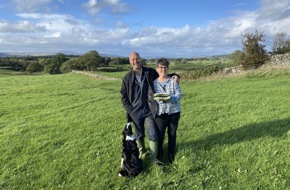Highlights
- Willing to challenge accepted practice to create this innovative business
- Increase in net food production
- Resilience to market fluctuations and supply shortages
- Many sustainability actions, resulting in significant improvements compared to UK farming averages: 50% reductions in greenhouse gas emissions, 90% reductions in chemicals use, 70% reduction in disease in cattle and 400% increase in biodiversity
- A more humane way to rear cows, increasing their wellbeing, growth rates and longevity

Rainton Farm/ The Ethical Dairy is an innovative business, resulting from the determination to produce affordable, nutrient-dense food, profitably and humanely, without damaging the planet. To that end, they researched into alternatives to mainstream farming practice, and committed over the long term to a whole farm system change. They have been an organic dairy farm for more than 20 years, introduced pasture fed regenerative agroecological farming methods 12 years ago, and became Europe’s largest cow-with-calf dairy farm in 2016 after ten years of research to ascertain whether such a system was viable. They produce nutritional-dense food (milk, dairy) from sunlight and water (via organic pasture), with as little artificial inputs as possible, and with minimum waste or resource depletion, while enhancing biodiversity and resilience.
In their transition from conventional farming to their current model they initially saw reductions in production, both when converting to organic and to cow-with-calf systems, but have now increased net food production. While less milk is available for sale, this approach results in a net increase in food produced, through reductions in external inputs and a near circular production system. Their land can now support 130 cows (previously 100), calves have doubling growth rate, and they are producing as much if not more milk than the expected for a standard pasture fed system.
Their choice for a cow-with-calf practice means that the calves stay with their mums for 5-6 months to suckle naturally, free range, organic, and out on pasture – a much more humane approach than thatmost commonly followed in the UK, of separating calf and mum within 24 hours of birth.
They place strong emphasis on good animal husbandry, with selective breeding and focus on animal wellbeing. This results in reduced animal stress, which in turn leads to significantly less requirement for medical interventions, such as antibiotics, vaccines and other medicated inputs – ‘prevention is better than a cure' – and increased animal disease resilience.
To maintain the pasture, reseeding is only required every 15-20 years, and so they only reseed 25-30 acres of land each year. They use herb-rich seed mixtures, to encourage biodiversity. Farm organic waste is fed into an experimental anaerobic digester (AD) and the methane biogas from that used to produce hot water for the cow and cheese dairies. Digestate – the product of the AD – is spread on fields using an umbilical dribble bar system reducing soil compaction and de-oxygenation and is a more powerful fertilizer than raw slurry and doesn’t smell.
Digestate (a liquid compost) application and stopping all ploughing has enriched soil organic matter. Over the 25 year period, Rainton Farm's soil's organic matter content increased from 11% to 14%; the farm is carbon negative, as the amount carbon locked by the soil per year as a result of this increase in organic content is more than the farm's carbon emissions.
The higher organic content of the soil resulted in an increase in species biodiversity, with the reappearance of dung beetles and the return of many natural vegetation species to the pastures. Also boosting biodiversity improvements, they have planted broadleaf woodlands, with 10% of the farm's 850 acres now covered with 35,000 trees. They have created five ponds, and have fenced waterways, to avoid pollution. Following species' surveys two large areas of their land were designated as Local Wildlife Sites, for their high biodiversity value.
In relation to energy use and efficiency measures and de-carbonising energy use, Rainton Farm/ The Ethical Dairy have been putting in place several measures, over the years: they switched to movement-activated LED lights, installed solar panels, a wind turbine and 600 metres of underground piping for ground source heat pumps (work still ongoing), and designed and installed an anaerobic digestion plant, to transform farm waste into energy and fertiliser.
Regarding waste minimisation measures, in addition to the anaerobic digester, they are taking action to minimise waste and plastic use by having plastic-free, compostable packaging with wool insulation, and providing a plastic-free option at checkout of The Ethical Dairy online shop.
Rainton Farm is resilient to market fluctuations and supply shortages as, with their regenerative agroecological farming methods, they eradicated their reliance on animal feed, pesticides and fertilisers, and animal medicines.
Rainton Farm/ The Ethical Dairy are involved in positive action with the community and other organisations in several ways. They installed the wind turbine sited on the farm in collaborating with the local Community Development Trust, and this energy supply provides a seed funding revenue stream for local community projects. They work with environmental organisations to monitor and record biodiversity on the farm. They participate in the local Economic Leadership Group, advising on approaches to rural economic development. They partner with Nourish to develop policy proposals for Scottish rural development.
They also liaise directly with the local and wider community. The Ethical Dairy’s cheese is sold primarily directly to the consumer. They host educational visits for schools, college and university students, providing a range of learning opportunities, and pre-covid they held pre-schooler storytelling and activity events. Daily farm tours and other on-farm events like Spring Turnout, make farming more accessible to a wide range of people. They have supported staff in highlighting the human cost of intensive farming and its impact on mental health.
In summary, Rainton Farm/ The Ethical Dairy's pasture-fed cow-with-calf approach demonstrates that the top echelon of food productivity can be harnessed, contributes to building trust in organic production, and helps build the mature market for nature-based food systems.